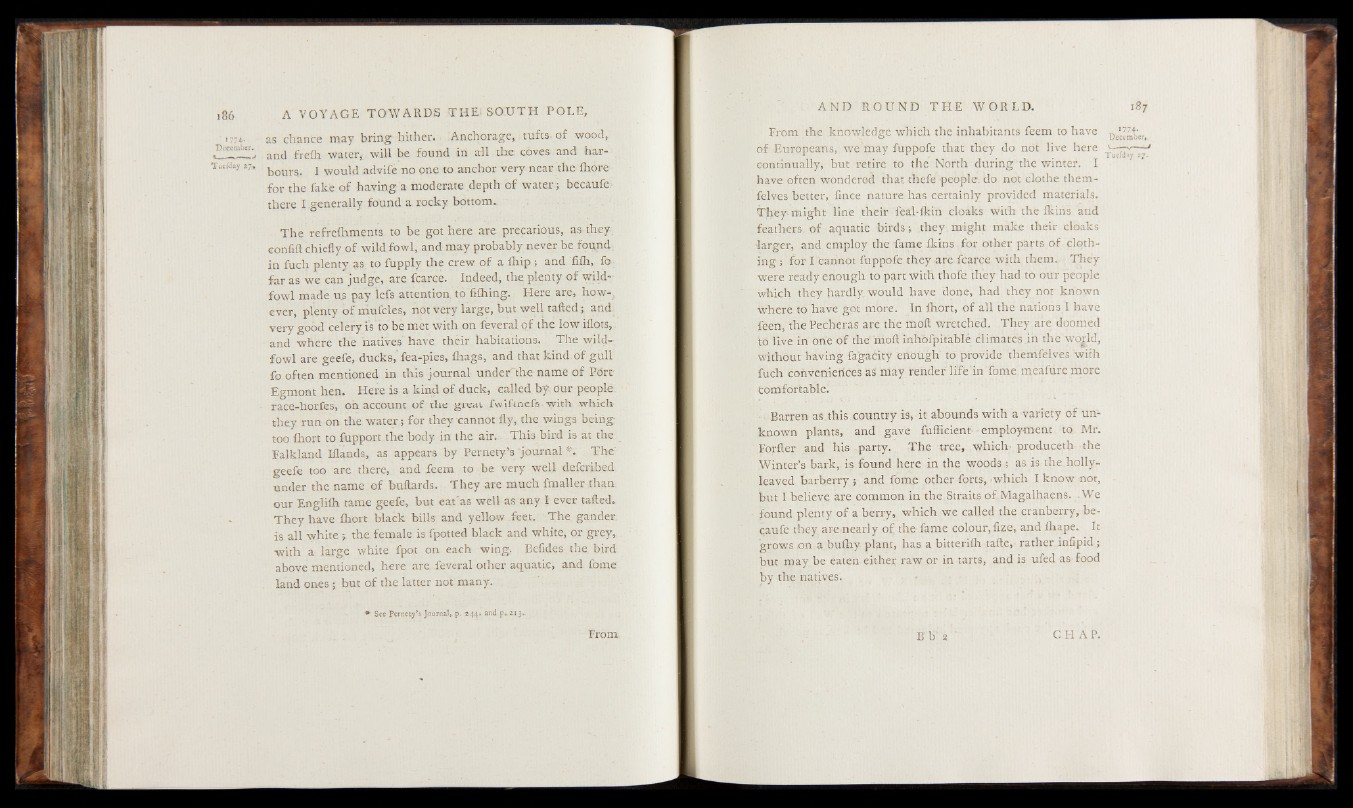
1774. as chance may bring hither, .Anchorage, > tufts, of wood,
December and frefll water. will be found in all the, coves, and har-
Tucfday 27, b o u r s _ J W0U1C1 advife no one to anchor very near the Ihore
for the fake of having a moderate depth of water; becaufe-
there I generally found a rocky bottom.
The refrefhments to be got here are precarious, as they ,
confift chiefly of wild fowl, and may probably never be found
in fuch plenty as: to fupply the crew of a fhip ; and 'filh, fo
far as we can judge, are fcarce. Indeed, the plenty of wildfowl
made us pay lefs attention, to fifhing. Here are, how-,
ever, plenty of mufcles, not very large, but well tafted; and'
very good celery is to be met with on feveral o f the low iflots,
and where the natives'have their habitations. The wildfowl
are geefe, ducks,’ fea-pies, fhags, and that kind of gull
fo often mentioned in this journal under'~the name of Port
Egmont hen. Here is a kind of duck, ealled by Our people
race-horfes, on account of the great fwiftnefs with which-
they run on the water; for they cannot fly, the wings being:
too fhort to fupport the body in the air. This bird is at the
Falkland Iflands, as appears by Pernety’s journal *. The
geefe too are there, and ieem to be very well deferibed
under the name of buftards. They are much fmaller than
our Englifh tame geefe, but eat'as well as any I ever tafted.
They have fhort black bills and yellow feet. The gander
is all white , the female is fpotted black and white, or grey,
with a large white fpot on each wing. Befides the, bird
above mentioned, here are feveral other aquatic, and fome
land ones ; but of the latter not many.
* See Fernety’s Journal, p. 244. and p.213.
From
From the knowledge which the inhabitants feem to have
of Europeans, we may fuppofe that they do not live here
continually, but retire to the’ North during the winter. I
have often wondered that thefe people, do not clothe them-
felves better, fince nature has certainly provided materials.
They might line their feal-fkin cloaks with the fkins and
feathers of aquatic birds; they might make their cloaks'
■ larger, and employ the fame fkins for other parts of clothing
; for I Cannot fuppofe they are fcarce with them. They
were ready enough to part with thofe they had to our people
which they hardly, would have done, had they not known
where to have got more. In fhort, of all the nations I have
feen, thePecheraS are the moft wretched. They are doomed
to live in one of the1 moft inhofpitable climates in the wojrld,
without having fagacity enough to. provide themfelves with
fuch conveniences as may render life in fome meafure more
Comfortable.
Barren as,this country is, it abounds with a variety of unknown
plants, and gave fufhcient employment to Mr.
Border and his party. The tree, which- produceth the
Winter’s bark, is found here in the woods ; as is the hollyleaved
barberry ; and fome other forts, which I know not,
but 1 believe are common in the Straits of Magalhaens. .We
found plenty of a berry, which we called the cranberry, be-
caufe they are nearly of the fame colour, fize, and fhape. It
grows on a bufhy plant, has a bitterifh tafte, rather infipid ;
but may be eaten either raw or in tarts, and is ufed as food
by the natives.
Tuefday 27
B b CH A P .